April 2016
Bram Moolenaar, treasurer of ICCF Holland, visited the Kibaale Children's
Centre in April 2016. This is his report.
You can find more pictures on
Google Photos.
A short video can be found on
Youtube
Graduation
About half of the children sponsored through ICCF are in higher education.
They do not live and study in Kibaale but go to a boarding school, far away
from home. And these studies are tough. Only the best students are accepted
and even then they struggle to pass exams. Fortunately we have not had a
drop-out in two years.
A good example is Kaweesi Emmanuel. He finished secondary school in Kibaale
in 2007, with very good grades. He did A-levels in Masaka and again finished
with very good scores, 23 out of 25 points. He then wanted to study law in
Kampala. That is a five year study, a big commitment for the sponsor.
Fortunately the sponsor agreed. Then there were problems applying for the
study, but in September 2010 he could finally start his first year at Makerere
university.
After five years of tough studies and the sponsor paying large yearly payments,
Emmanuel graduated for the law degree in January 2015. But that's not the
end yet! Another year of Bar course at the Law Development Centre was
required. Emmanual has finished this now and the final graduation was April
29th. He is the first lawyer to come out of our sponsorship program!
We are very proud of Emmanuel. He comes from a poor family, sleeping on the
floor in a tiny house with no electricity, water or TV. And now he is a
lawyer! He is an example for other children who sometimes need a bit of
motivation for their studies.
|
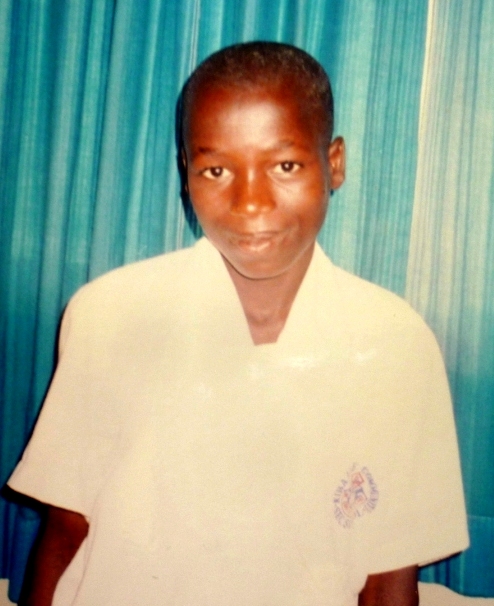
Kaweesi Emmanuel in the first class of secondary school.
|
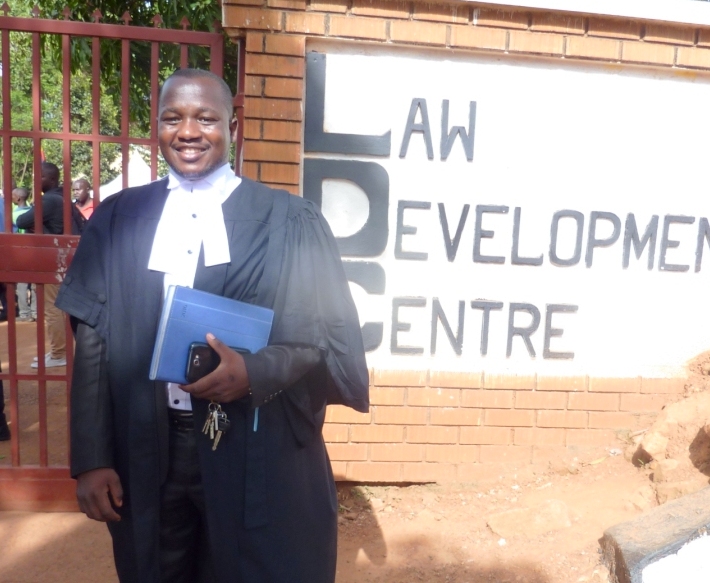
Kaweesi Emmanuel at his graduation for the bar course.
|
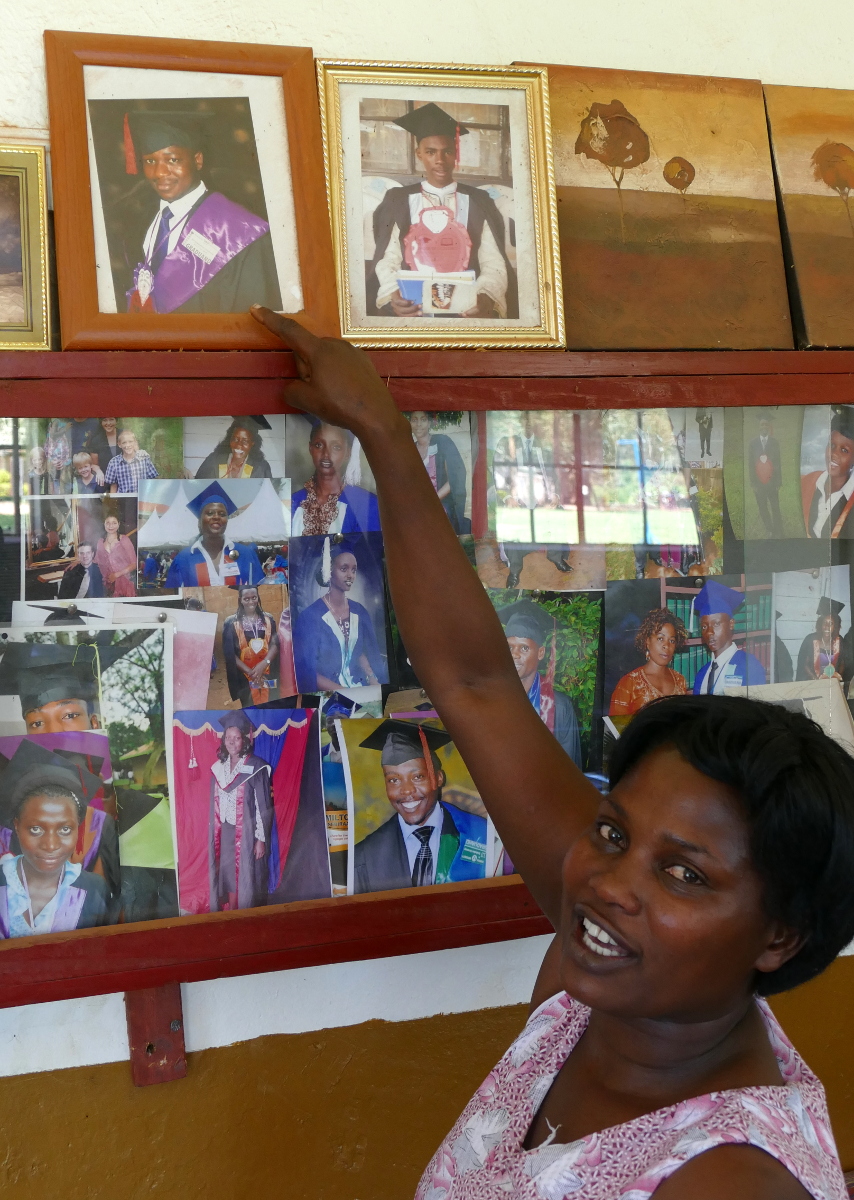
Samalie points out the picture of Emmanuel's graduation in 2015, in the "graduation hall of fame"
|
|
|
Finishing education
While going through the list of sponsored children I find twelve children that
finished their studies. Many of them in university, some did motor vehicle
repair or carpentry. That is wonderful, many of them have already found a
job.
Many organisations only sponsor young children, in primary and perhaps in
secondary school. But that is insufficient to find work. Therefore we try to
help the children all the way through professional education. This is
expensive, they can't possibly raise the funds themselves. Without our help
they would only have a half-finished education.
I brought one laptop that is still working well, only the touchpad has a
problem. After a short discussion the staff decides to give it to Ojok
Maurice. He studies civic engineering and was desperate for a computer, he
needs it for his assignments. I have a donation for one more computer, they
will decide later who needs it most. There are many students that need one,
but unfortunately we can only afford a few.
|
Full grown school
Over the years the school in Kibaale has been growing. We now have 3 classes
of 20 children in nursery and kindergarten, 2 classes of 30 children in each
level of primary and secondary, all the way up to S4. Two classroom blocks
have been build since I was last in Kibaale. That means the school is now at
its full size. This is a good size to run the school efficiently, we don't have
plans to make it any bigger.
But there are still opportunities for growth and improvement. The special
needs class, mostly deaf children, stands out from the rest. These children
would otherwise be completely neglected. By teaching them skills we give them
a chance. The teacher has plans for setting up a place where the children
can work and sell the items they make, such as clothes and baskets.
They would also like to start a special needs class in another village. The
children there are too far away from Kibaale to make the walk every day.
|
|
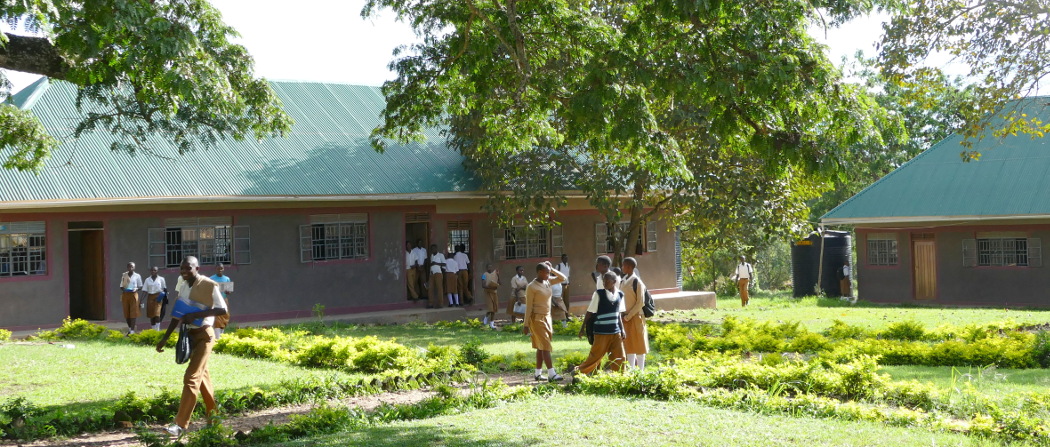
Two new blocks with each two classrooms for the secondary school.
|
Further growth
Every time I visit Uganda I see more. More cars. More buildings. More
technology. Kibaale now has a connection to the electricity net. Only in the
town center though, mostly used by shops and workshops. There is only one
transformer and most families can't afford it, but it's a start. Welding,
maize grinding and other things that require electricity can now happen in
Kibaale. And watching TV, of course. Especially British football is
popular, in houses I visited I have seen posters of Manchester United and
Arsenal.
One electricity line reaches the project, but it's not connected yet. We
would like to get a transformer, but that's expensive and requires a lot of
paperwork. The plan is to only connect the clinic for now. The rest of the
center can keep using solar power and a generator for a while.
I also see more mobile phones. Many of our older students now have them. That
seems like a luxury, but if you realize they don't have to take a taxi to be
able to talk to someone it actually saves money. Also for our office, they
can call the students to make an appointment and check on their status.
Previously they would have to visit remote schools, which takes a lot of time.
More growth is to happen in Masaka. The Timothy centre currently has a
hundred students. To work efficiently it should grow to three hundred. There
are discussions about also accepting boys. Running an A-levels boarding
school has quite a few challenges. And we want to make it a very good school!
|
|
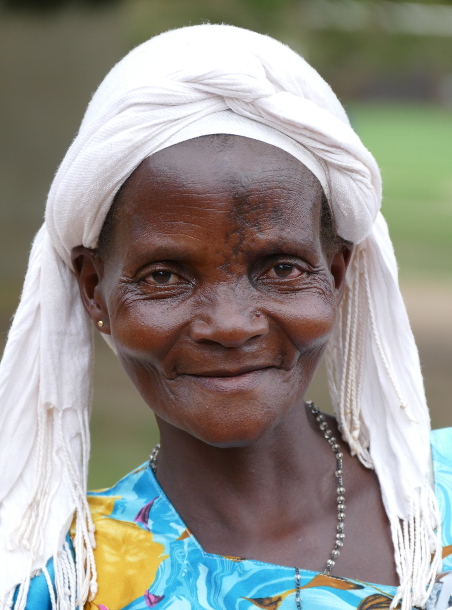
A grandmother, taking care of one of our children, visiting the school.
|
Bram Moolenaar
You can find more pictures on
Google Photos.
A short video can be found on
Youtube
top
|

